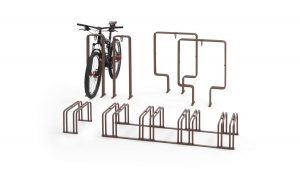
Design by Alberto Basaglia Natalia Rota Nodari
Modular, practical, resistand and design friendly bicycle racks. The racks are modular elements, which can also be attached by means of plates to the other elements of the collection. This is how practical seating and hooking compositions are formed. Four types of bicycle rack, from the classic on the ground with or without spacer plates, to a pole bicycle rack version, which provides the positioning of the bike between the structure, to the more innovative one in support, which has a square structure, also suitable for the function of bollard, where the bikes lean on the sides and are hooked using the whole large structure.
| Price | |
|---|---|
| Leadtime |